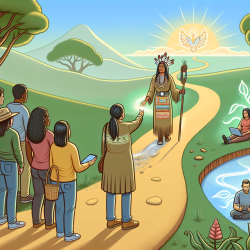Introduction
In the realm of mental health services, especially within Indigenous communities, there exists a pressing need for models that not only address mental wellness but also resonate with cultural values and community needs. The research article titled "Examining Global Indigenous Community Wellness Worker Models: A Rapid Review" provides insightful findings that can guide practitioners in enhancing their skills and approaches. This blog will delve into the key outcomes of this research and how they can be applied to improve service delivery and encourage further exploration.
The Promise of Community Wellness Worker Models
The rapid review conducted by Fitzpatrick et al. (2024) highlights the promising role of Community Wellness Worker (CWW) models in bridging the gap between Indigenous communities and mainstream health services. These models emphasize the integration of Indigenous cultural knowledge with Western practices, creating a holistic approach to mental wellness. The review identifies four interconnected themes crucial to the success of CWW models:
- Worker Roles and Responsibilities: CWWs serve as cultural brokers, facilitating communication and understanding between service providers and community members. Their roles extend beyond conventional health services, incorporating cultural practices and holistic care.
- Worker Training, Education, and Experience: Emphasizing lived experience over formal education, CWW models focus on on-the-job training, integrating Indigenous and Western methods to equip workers with necessary skills.
- Decolonized Approaches: These models prioritize Indigenous-led initiatives, blending cultural values with Western practices to create a supportive and effective care environment.
- Structural Supports: Ensuring supportive work environments and integrating systems are vital for the success of CWW models, promoting well-being and effective service delivery.
Implementing CWW Models in Practice
For practitioners in speech-language pathology and related fields, the integration of CWW models can enhance service delivery in several ways:
- Cultural Competency: By understanding and incorporating Indigenous cultural practices, practitioners can create a more inclusive and effective therapeutic environment.
- Holistic Approaches: Emphasizing the interconnectedness of mental, physical, and spiritual well-being can lead to more comprehensive care plans.
- Community Engagement: Engaging with community members and leaders ensures that services are relevant and responsive to local needs.
Encouraging Further Research
While the rapid review provides a foundational understanding of CWW models, further research is essential to explore their full potential and address existing barriers. Practitioners are encouraged to engage in collaborative research efforts with Indigenous communities to develop tailored models that uphold cultural values and promote self-determination.
Conclusion
The integration of Community Wellness Worker models presents a transformative opportunity to enhance mental health services in Indigenous communities. By embracing cultural knowledge and holistic approaches, practitioners can contribute to improved outcomes and foster a more inclusive healthcare system. To read the original research paper, please follow this link: Examining global Indigenous community wellness worker models: a rapid review.










